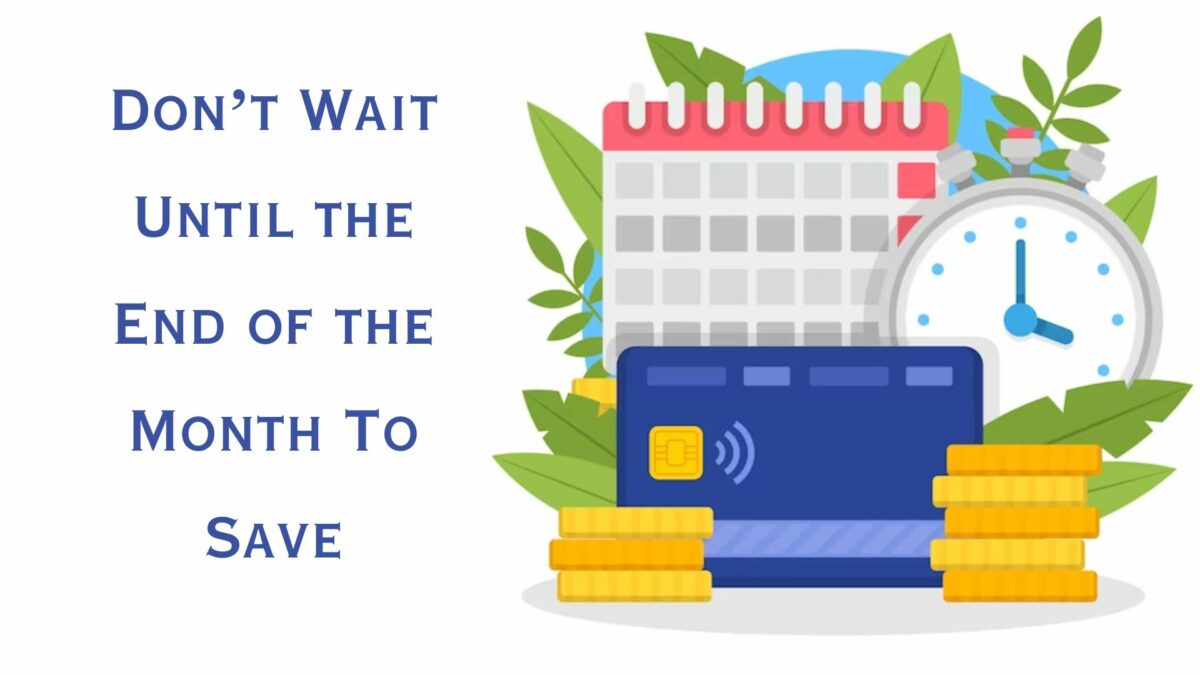“If you would be wealthy, think of saving as well as getting.”
– Ben Franklin
My wife and I have typically been paid twice a month. For a long time, we took the approach of putting whatever was left over at the end of the month into saving and investing. We did pay extra towards my student loan, which helped out significantly, but, at the end of the month, surprisingly enough, the amount that we’d sock away was much less than we anticipated.
Actually, when we thought about it and looked at our behavior, it was not a surprise at all. There were several reasons that the leftover amount at the end of the month was much less than we would have hoped.
- We were using credit cards to pay for everything. While we were paying off our credit card bill in full each month, we were effectively a month behind, since each credit card payment was for the previous month’s spending.
- The wait until the end of the month approach didn’t put any brakes on spending during the month. As long as we were living below our means, we figured that we were doing well. We fell victims to the mindset of “Hey! At least we’re saving something! That’s good, right?” It isn’t.
- We were not budgeting. Since we didn’t have any set allocations for what we were going to spend, aside from paying our bills each month (mortgage, student loan, balance from previous month’s credit card statement), there were no boundaries that we were setting with our spending.
Take an active approach to managing your money (and your Monkey Brain)

It wasn’t until we intentionally changed our behavior that things began to change. The change was that we budgeted. Budgeting and saving, specifically paying yourself first, go hand in hand. It is almost impossible to pay yourself first if you don’t know how much money you have to pay yourself with. That’s why budgeting is so important. It allows you to prioritize where your money is going. It also allows you to save and pay down debts with intentionality.
Budgeting helps you short circuit your Monkey Brain. – Click to Tweet
Even though I had religiously tracked where our money went by using Microsoft Money and then Mint, I was taking a reactive view to the money rather than a proactive view. By adding budgeting on top of the reactive view, we were able to direct money and spend with intentionality.
Budgeting imposed a discipline on us which gave us many benefits.
- We paid extra on our mortgage first (by this time, we’d paid off student loans). We also decided on a formula for found money that allowed us to have a little fun while continuing to hammer away at the mortgage.
- We set aside money for cash reserves each month. By making the decision up front, we saved a lot more than we had previously.
- We forced ourselves to rigorously prioritize what was important to us. Suddenly, cable didn’t seem that important compared to our other life goals. Neither did the 3-4 times a week Starbucks habit.
- We created new savings categories. Christmas comes every year. Why not save for it a little bit each month?
- It gave us a timeline for paying off the mortgage. Previously, we’d taken the approach that we’d throw extra at the mortgage when we could (we rarely did, it turns out) and then hopefully one day pay it off somewhat early. Now, we had a plan and concrete dates. Every time we ticked up the payoff date by a month, it was a small personal victory. Getting the mortgage paid off was one of the best Christmas gifts we could have given ourselves.
We thought that budgeting and intentionally saving more and paying off debt faster would cause us to have to take a lifestyle hit. We have found that focusing on the few things which really matter to us has meant that we didn’t have to sacrifice our lifestyles to gain those benefits. Instead, we got rid of the money leaks at the fringes of our lives which didn’t have very much importance to us.
The best benefit was that going through the process forced us to reevaluate our priorities in life and determine what it was that made us happy and what we enjoyed doing. Rather than living life on autopilot, we chose, with intentionality, what it was that we wanted to do and focused ourselves on the steps we needed to take to be able to do those things.
Our gain was our mortgage holder’s loss.
What do you think? Join in the conversation below!
Author Profile
- John Davis is a nationally recognized expert on credit reporting, credit scoring, and identity theft. He has written four books about his expertise in the field and has been featured extensively in numerous media outlets such as The Wall Street Journal, The Washington Post, CNN, CBS News, CNBC, Fox Business, and many more. With over 20 years of experience helping consumers understand their credit and identity protection rights, John is passionate about empowering people to take control of their finances. He works with financial institutions to develop consumer-friendly policies that promote financial literacy and responsible borrowing habits.
Latest entries
 Low Income GrantsSeptember 25, 2023How to Get a Free Government Phone: A Step-by-Step Guide
Low Income GrantsSeptember 25, 2023How to Get a Free Government Phone: A Step-by-Step Guide Low Income GrantsSeptember 25, 2023Dental Charities That Help With Dental Costs
Low Income GrantsSeptember 25, 2023Dental Charities That Help With Dental Costs Low Income GrantsSeptember 25, 2023Low-Cost Hearing Aids for Seniors: A Comprehensive Guide
Low Income GrantsSeptember 25, 2023Low-Cost Hearing Aids for Seniors: A Comprehensive Guide Low Income GrantsSeptember 25, 2023Second Chance Apartments that Accept Evictions: A Comprehensive Guide
Low Income GrantsSeptember 25, 2023Second Chance Apartments that Accept Evictions: A Comprehensive Guide

